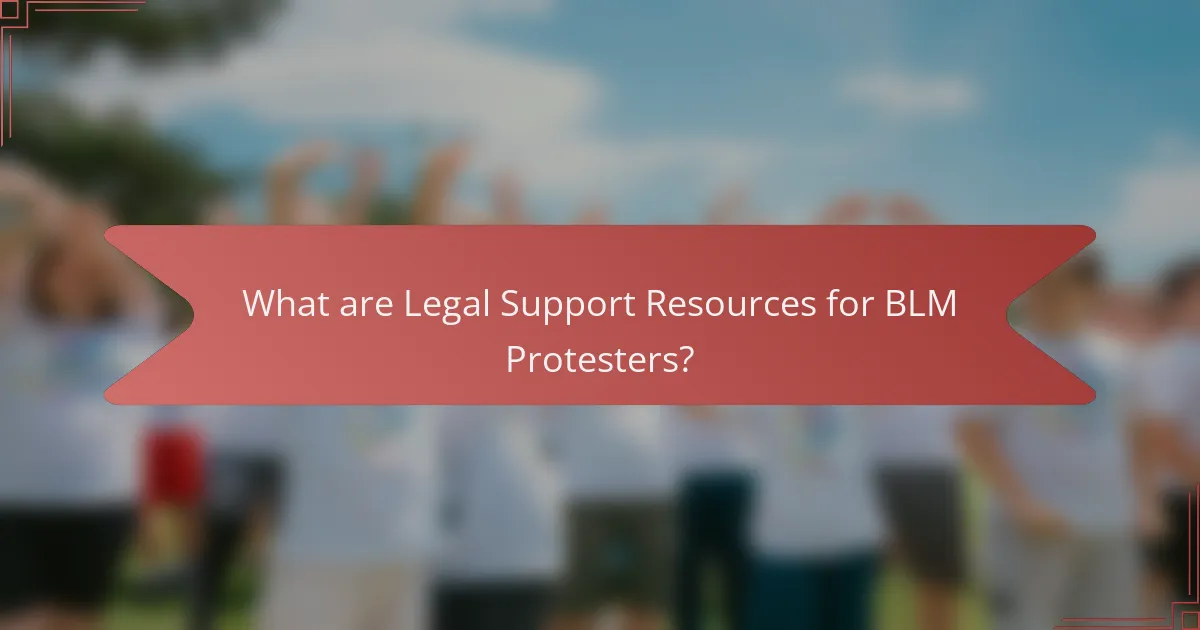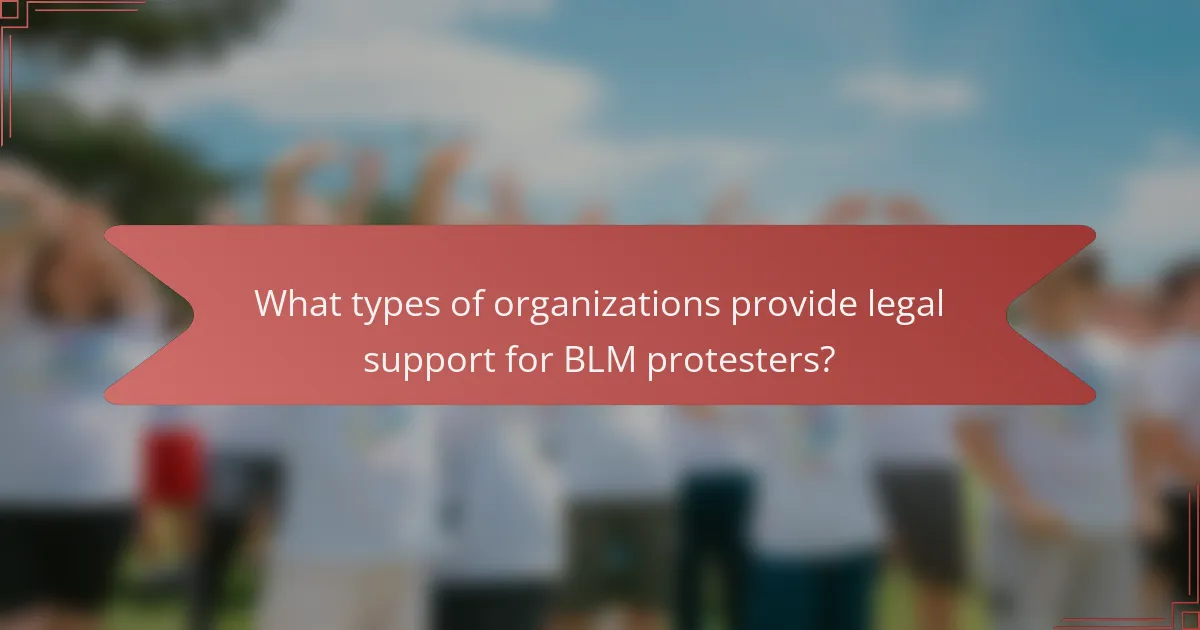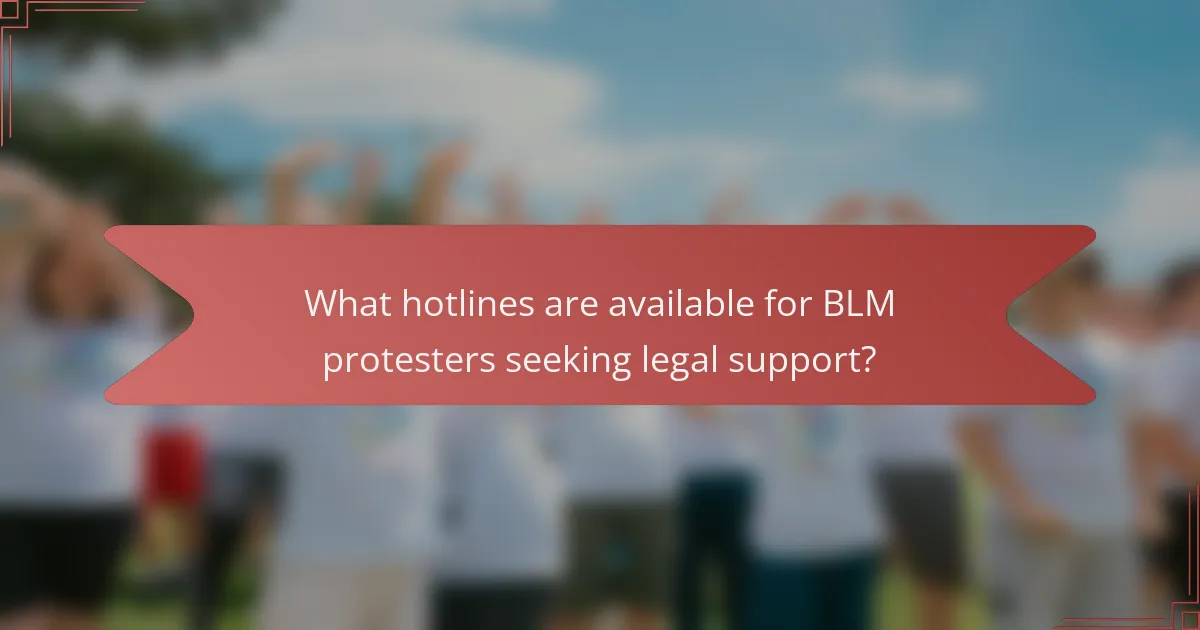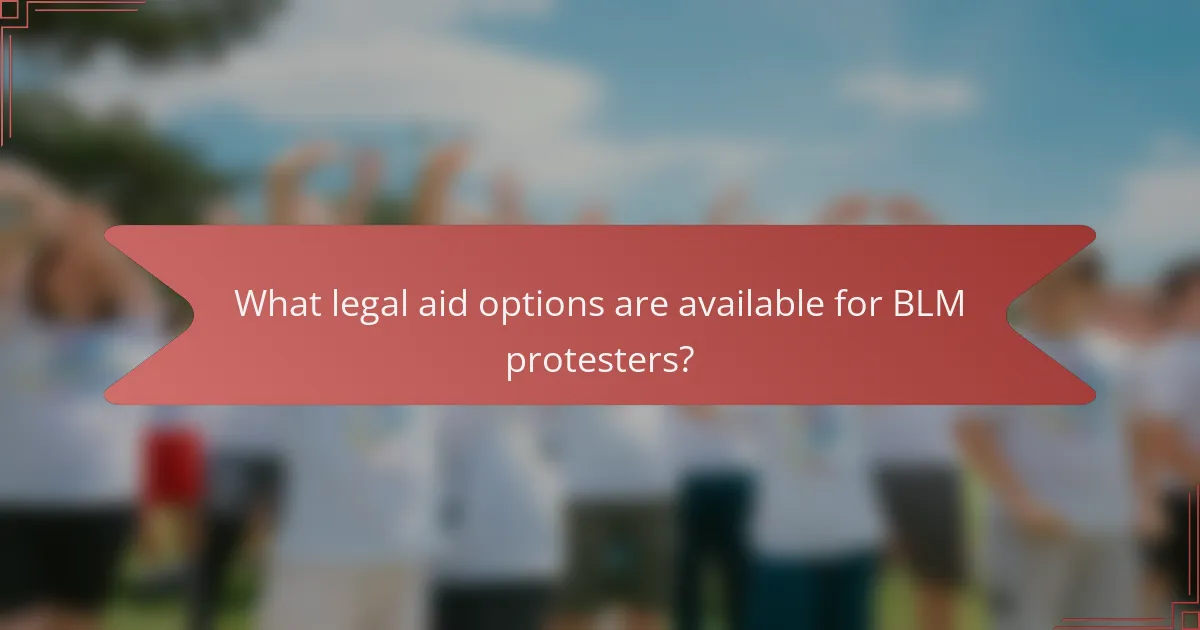
What are Legal Support Resources for BLM Protesters?
Legal support resources for BLM protesters include various organizations, hotlines, and legal aid services. Organizations like the National Lawyers Guild provide legal assistance and know-your-rights training. The ACLU offers resources to protect civil liberties during protests. Hotlines such as the Protestor Hotline can connect individuals with legal representation. Local legal aid offices often help with legal issues arising from protests. These resources are vital for ensuring protesters’ rights are upheld. Access to legal support can significantly impact the outcomes of legal situations faced by protesters.
How do these resources assist protesters during demonstrations?
Legal support resources assist protesters during demonstrations by providing essential legal guidance and representation. These resources help individuals understand their rights while participating in protests. Organizations offer legal hotlines that provide immediate advice during events. Legal aid services assist in navigating potential arrests or charges. Many groups monitor protests to document incidents of police misconduct. They also provide bail funds to support the release of detained protesters. Access to legal resources can deter unlawful actions by law enforcement. Studies show that legal representation increases the likelihood of favorable outcomes in court.
What types of legal issues do protesters commonly face?
Protesters commonly face various legal issues, including arrest, charges of disorderly conduct, and violations of local ordinances. Arrests can occur during protests, especially if participants are accused of unlawful assembly. Disorderly conduct charges often arise from actions perceived as disruptive or aggressive. Violations of local ordinances may include failure to obtain permits for demonstrations. Additionally, protesters may encounter excessive use of force by law enforcement, leading to civil rights violations. Legal disputes can also involve claims of unlawful detainment or infringement of free speech rights. Historical context shows that such issues have been prevalent in high-profile movements, including the Black Lives Matter protests.
How can legal support resources mitigate these issues?
Legal support resources can mitigate issues faced by BLM protesters by providing essential legal assistance and guidance. These resources can offer access to attorneys who specialize in civil rights and protest-related cases. They help individuals understand their rights during protests and the legal implications of their actions. Legal hotlines can provide immediate advice in critical situations, ensuring protesters know how to respond to law enforcement. Organizations also conduct legal workshops to educate protesters on legal rights and responsibilities. Furthermore, they can help in coordinating legal representation for those arrested, reducing the chances of wrongful convictions. Statistics show that access to legal support significantly increases the likelihood of favorable outcomes in legal proceedings.
Why are legal support resources essential for BLM protesters?
Legal support resources are essential for BLM protesters to ensure their rights are protected. Protests can lead to arrests, legal challenges, and potential violence. Access to legal support helps protesters navigate the legal system effectively. Organizations provide legal advice, representation, and resources for those facing charges. Hotlines offer immediate assistance during protests. Legal aid can also help with civil rights cases related to police misconduct. According to the National Lawyers Guild, legal observers play a crucial role in documenting police actions. This documentation can be vital for future legal proceedings. Overall, legal support resources help safeguard the rights and safety of protesters.
What risks do protesters encounter without legal support?
Protesters without legal support face significant risks, including arrest and legal charges. They may not understand their rights during encounters with law enforcement. This lack of knowledge can lead to violations of their rights. Without legal representation, protesters might struggle to navigate court proceedings. They are also vulnerable to harsher penalties due to their inability to mount a proper defense. Additionally, they may face difficulties in filing complaints against police misconduct. The absence of legal support can exacerbate feelings of fear and intimidation. Overall, the risks increase significantly without access to legal assistance.
How does legal support empower protesters in their rights?
Legal support empowers protesters by providing them with knowledge of their rights. This legal guidance ensures that protesters understand what actions are protected under the law. Legal support also offers representation in case of arrests or legal challenges. Organizations like the National Lawyers Guild provide pro bono legal assistance. Access to legal aid can deter unlawful police actions against protesters. Statistics show that legal representation can lead to better outcomes in court. For example, cases with legal support often result in reduced charges or dismissals. Overall, legal support is crucial for safeguarding the rights of protesters.

What types of organizations provide legal support for BLM protesters?
Civil rights organizations provide legal support for BLM protesters. These organizations include the American Civil Liberties Union (ACLU) and the NAACP Legal Defense Fund. They offer legal representation and resources for individuals facing charges related to protests. Additionally, grassroots organizations like the National Lawyers Guild (NLG) also support protesters legally. They often provide legal observers during protests to document police interactions. Legal aid clinics and pro bono legal services also assist protesters in navigating legal challenges. These entities work to protect civil rights and ensure fair treatment under the law.
Which organizations are most recognized for their legal assistance?
The American Civil Liberties Union (ACLU) is one of the most recognized organizations for legal assistance. It provides legal support to individuals facing civil rights violations. The National Lawyers Guild (NLG) is another prominent organization offering legal aid, particularly during protests. The NAACP Legal Defense and Educational Fund also plays a crucial role in providing legal assistance for racial justice issues. Additionally, the National Association of Criminal Defense Lawyers (NACDL) offers resources and support for those in need of criminal defense. These organizations are well-known for their commitment to protecting legal rights and providing assistance in various legal matters.
What specific services do these organizations offer?
These organizations offer a range of legal support services for BLM protesters. They provide legal representation for individuals facing charges related to protests. Many organizations also offer legal advice and consultations to help protesters understand their rights. Additionally, some provide resources for bail funds to assist those detained during protests. They often create hotlines for immediate legal assistance during protests. Educational workshops on legal rights and protections are also common. Furthermore, these organizations may engage in advocacy to reform laws affecting protesters.
How do these organizations collaborate with local communities?
Organizations collaborate with local communities by providing legal resources and support. They often establish partnerships with community leaders and activists. This collaboration includes hosting workshops on legal rights. These workshops educate community members about their rights during protests. Organizations also offer hotlines for immediate legal assistance. They mobilize local volunteers to assist in legal processes. Additionally, they engage in outreach efforts to inform communities about available resources. This approach fosters trust and strengthens community ties.
How can protesters identify trustworthy legal organizations?
Protesters can identify trustworthy legal organizations by verifying their credentials and reputation. Look for organizations with a history of supporting civil rights and social justice. Check if they are registered non-profits or have legal accreditation. Review online testimonials and ratings from previous clients. Assess their transparency regarding funding and operations. Confirm that they provide clear contact information and accessible resources. Research their involvement in recent protests or legal cases related to civil rights. Organizations like the National Lawyers Guild have a longstanding reputation for supporting protesters.
What criteria should be used to evaluate these organizations?
Criteria to evaluate organizations providing legal support for BLM protesters include their track record, transparency, and expertise. Track record refers to the organization’s history of successfully providing legal aid in similar situations. Transparency involves clear communication about funding sources and operational practices. Expertise encompasses the qualifications of their legal staff and their experience with civil rights cases. Additionally, responsiveness to community needs is crucial. Organizations should demonstrate active engagement with the communities they serve. Lastly, partnerships with other credible entities can enhance their reliability and effectiveness.
How can online resources help in finding legal support organizations?
Online resources can significantly aid in locating legal support organizations. They provide searchable databases that list organizations by location and specialty. Websites like the American Bar Association offer directories for legal aid services. Social media platforms facilitate connections with local legal groups. Online forums and community boards often share recommendations for legal resources. Many organizations maintain websites with contact information and service details. Search engines can yield quick access to legal support resources. These resources enhance visibility and accessibility for those in need of legal assistance.

What hotlines are available for BLM protesters seeking legal support?
The National Lawyers Guild offers a hotline for BLM protesters seeking legal support. Their number is 1-844-899-9994. The hotline provides legal advice and assistance during protests. Additionally, the Black Lives Matter Global Network Foundation has resources for legal support. They can connect individuals with local legal aid organizations. These hotlines aim to help protesters navigate legal challenges. They ensure that individuals know their rights during protests. Legal support is crucial for protecting the rights of demonstrators.
What types of assistance can hotlines provide to protesters?
Hotlines can provide various types of assistance to protesters. They often offer legal advice and support. This includes information about rights during protests. Hotlines may also connect protesters with legal representation if needed. Additionally, they provide emotional support and crisis intervention. Some hotlines offer resources for medical assistance as well. They can help with coordinating safe transportation for protesters. Lastly, hotlines may also share information about local laws and regulations regarding protests.
How can hotlines guide individuals during legal encounters?
Hotlines can guide individuals during legal encounters by providing immediate access to legal advice. They offer information on rights and procedures relevant to specific situations. Many hotlines are staffed by legal professionals who can answer questions in real-time. This support can help individuals navigate complex legal systems. Additionally, hotlines may connect users with local legal resources or attorneys. They often provide emotional support during stressful encounters. Studies indicate that access to legal hotlines can improve outcomes for individuals facing legal issues. This demonstrates the effectiveness of hotlines in empowering individuals during legal challenges.
What information should protesters have ready when calling a hotline?
Protesters should have specific information ready when calling a hotline. Key details include their name and location. They should also provide a brief description of the situation. It is important to mention any injuries or arrests. Protesters should be ready to share the names of others involved. They should note the time and place of the incident. Additionally, having any relevant documentation on hand is beneficial. This information helps hotline operators assist effectively.
How do hotlines ensure confidentiality and safety for callers?
Hotlines ensure confidentiality and safety for callers by implementing strict privacy protocols. Callers are often provided with anonymous options, allowing them to share information without disclosing their identity. Many hotlines utilize secure communication channels to protect call data from unauthorized access. Staff members are trained to handle sensitive information with care and discretion. Additionally, hotlines may have policies in place to limit the sharing of caller information, even within the organization. This helps build trust and encourages individuals to seek help without fear. Studies show that confidentiality significantly increases the likelihood of individuals reaching out for support.
What measures are in place to protect the anonymity of callers?
Hotlines for legal support often implement various measures to protect caller anonymity. These measures include caller ID blocking to prevent identification. Additionally, many hotlines use encrypted communication methods. This ensures that conversations remain private and secure. Staff members are trained to handle sensitive information discreetly. Many organizations also have policies in place to delete call records regularly. These protocols help maintain the confidentiality of the individuals seeking assistance.
How do hotlines handle sensitive information regarding legal cases?
Hotlines handle sensitive information regarding legal cases with strict confidentiality protocols. They often utilize secure communication methods to protect caller identities. Staff members are trained to manage sensitive data responsibly. Many hotlines implement data encryption to safeguard information. They may also follow legal guidelines for data retention and sharing. In some cases, hotlines provide anonymity to encourage open communication. This approach helps build trust between callers and hotline staff. Overall, these measures ensure that sensitive information remains protected throughout the legal support process.

What legal aid options are available for BLM protesters?
BLM protesters have access to various legal aid options. Organizations like the National Lawyers Guild provide legal assistance and representation. Local legal aid clinics often offer pro bono services for those arrested during protests. Additionally, hotlines are available for immediate legal advice. Some cities have specific funds to assist protesters with legal fees. Online resources also provide information on rights and legal support. These options are crucial for ensuring that protesters receive necessary legal protection.
What types of legal aid services can protesters access?
Protesters can access various types of legal aid services. These services include legal representation, advice, and assistance during protests. Organizations often provide hotlines for immediate legal support. Some offer resources for understanding rights and legal procedures. Additionally, there are funds available to cover legal fees for arrested protesters. Legal aid clinics may also offer pro bono services. Many groups focus on specific issues, such as civil rights violations. These services aim to protect protesters’ rights and ensure fair treatment under the law.
How do pro bono services work for individuals in need?
Pro bono services provide free legal assistance to individuals in need. Lawyers volunteer their time to help those who cannot afford legal representation. These services often focus on civil rights, housing, and immigration issues. Organizations like the American Bar Association facilitate connections between lawyers and clients. Individuals can access pro bono services through legal aid organizations or community groups. Eligibility typically depends on income and the nature of the legal issue. Many pro bono programs also offer clinics or workshops to educate individuals about their rights. This support is crucial for ensuring access to justice for marginalized communities.
What are the eligibility requirements for accessing legal aid?
Eligibility requirements for accessing legal aid typically include income limitations. Individuals must demonstrate that their income falls below a certain threshold. This threshold varies by jurisdiction and is often set as a percentage of the federal poverty level. Additionally, applicants may need to show that their legal issue qualifies for assistance. Common qualifying issues include criminal defense, family law, and housing disputes. Some legal aid organizations may also consider the applicant’s assets. Proof of income and legal documentation may be required during the application process.
How can protesters effectively utilize legal aid resources?
Protesters can effectively utilize legal aid resources by first identifying local legal aid organizations. These organizations often provide free or low-cost legal assistance. Protesters should reach out to these groups before attending a protest to understand their rights. They can also obtain legal advice on how to conduct protests lawfully. During protests, having legal observers present can help document any legal issues. Protesters should carry contact information for legal aid hotlines for immediate assistance. Following arrests, contacting legal aid promptly can facilitate legal representation. Many legal aid organizations also offer resources online, including know-your-rights guides.
What steps should protesters take to seek legal aid?
Protesters should first identify legal aid organizations that specialize in civil rights and protest-related issues. They can search online for local legal aid clinics or national organizations like the National Lawyers Guild. Next, protesters should gather any relevant documentation, such as arrest records or incident reports, to present to legal aid representatives. They should then contact these organizations directly, either through phone or email, to request assistance. Many organizations have hotlines specifically for protesters, which can provide immediate legal advice. Additionally, protesters should be prepared to explain their situation clearly and concisely when seeking help. It is essential to follow up if they do not receive a timely response. Many legal aid organizations also offer resources on their websites that can guide protesters through the legal process.
What common challenges might protesters face when accessing legal aid?
Protesters commonly face several challenges when accessing legal aid. Limited availability of resources can hinder their ability to find legal representation. Many legal aid organizations are overwhelmed with requests, leading to longer wait times for assistance. Language barriers may prevent some protesters from effectively communicating their needs. Additionally, financial constraints can limit access to private legal counsel. Geographic location also plays a role; some areas have fewer legal aid resources available. Awareness of available services can be lacking among protesters, resulting in underutilization of legal support. Lastly, fear of repercussions from authorities can deter individuals from seeking legal help.
What best practices should BLM protesters follow when seeking legal support?
BLM protesters should document all interactions with law enforcement. This includes taking notes and recording video when possible. They should also gather witness information to support their case. Seeking legal support from established organizations is crucial. Groups like the National Lawyers Guild provide resources and assistance. Protesters should know their rights and understand legal processes. Having a legal observer present can help ensure rights are protected. Additionally, creating a support network for sharing information is beneficial. These practices enhance the chances of receiving effective legal support.
Legal support resources for BLM protesters encompass organizations, hotlines, and legal aid services that provide essential assistance during demonstrations. Key entities include the National Lawyers Guild and the ACLU, which offer legal representation, know-your-rights training, and immediate advice through hotlines. The article discusses common legal issues faced by protesters, such as arrests and charges, and highlights how access to legal support can mitigate these challenges. It also details the specific services provided by various organizations, the importance of community collaboration, and best practices for effectively utilizing legal aid resources.